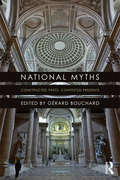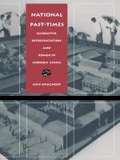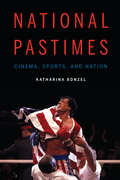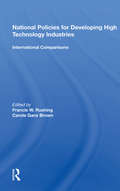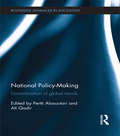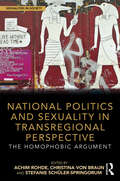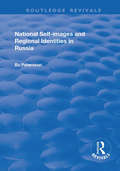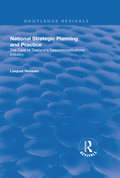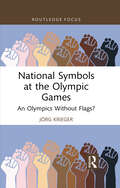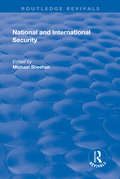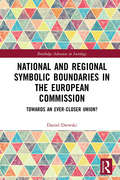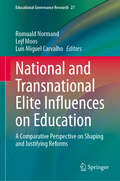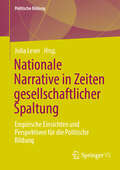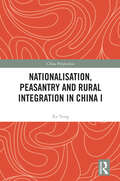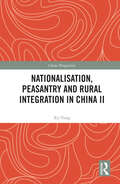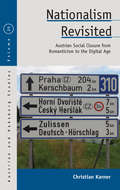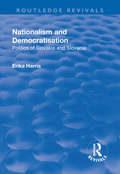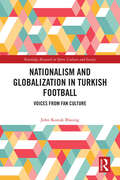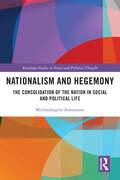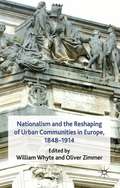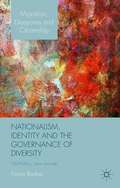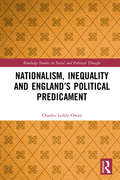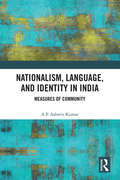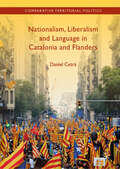- Table View
- List View
National Myths: Constructed Pasts, Contested Presents
by Gérard BouchardNational myths are now seriously questioned in a number of societies. In the West, for instance, a number of factors have combined to destabilise the symbolic foundation of nations and collective identities. As a result, the diagnosis of a deep cultural crisis has become commonplace. Indeed, who today has not heard about the erosion of common values or the undermining of social cohesion? But to efficiently address this issue, do we know enough about the nature and role of myths in modern and postmodern societies? Against this background, National Myths: Constructed Pasts, Contested Presents relies on a sample of nations from around the world and seeks to highlight the functioning of national myths, both as representations that make sense of a collectivity, and as socially grounded tools used in a web of power relations. The collection draws together contributions from international experts to examine the present state of national myths, and their fate in today’s rapidly-changing society. Can – or must – nations do without the sort of overarching symbolic configurations that national myths provide? If so, how to rethink the fabrics and the future of our societies? This book will appeal to students and scholars interested in sociology, national, identity and memory studies, myths, shared beliefs, or collective imaginaries.
National Past-Times: Narrative, Representation, and Power in Modern China
by Ann AnagnostIn National Past-Times, Ann Anagnost explores the fashioning and refashioning of modern Chinese subjectivity as it relates to the literal and figurative body of the nation. In essays revealing the particular temporality of the modern Chinese nation-state, Anagnost examines the disparate eras of its recent past and its propensity for continually looking backward in order to face the future.Using interviews and participant observation as well as close readings of official documents, propaganda materials, and popular media, Anagnost notes the discontinuities in the nation's narrative--moments where this narrative has been radically reorganized at critical junctures in China's modern history. Covering a broad range of issues relating to representation and power--issues that have presented themselves with particular clarity in the years since the violent crackdown on the student movement of 1989--National Past-Times critiques the ambiguous possibilities produced by the market, as well as new opportunities for "unfreedom" in the discipline of labor and the commodification of women. Anagnost begins with a retrospective reflection on the practice of "speaking bitterness" in socialist revolutionary practice. Subsequent essays discuss the culture debates of the 1980s, the discourse of social disorder, the issue of population control, the film The Story of Qiu Ju, and anomalies at the theme park "Splendid China."
National Pastimes: Cinema, Sports, and Nation (Sports, Media, and Society)
by Katharina BonzelSports have long fascinated filmmakers from Hollywood and beyond, from Bend It Like Beckham to Chariots of Fire to Rocky. Though sports films are diverse in their approach, style, and storytelling modes, National Pastimes discloses the common emotional and visual cues that belie each sports film&’s underlying nationalistic impulses. Katharina Bonzel unravels the delicate matrix of national identity, sports, and emotion through the lens of popular sports films in comparative national contexts, demonstrating in the process how popular culture provides a powerful vehicle for the development and maintenance of identities of place across a range of national cinemas. As films reflect the ways in which myths of nation and national belonging change over time, they are implicated in important historical moments, from Cold War America to the class dynamics of 1980s Thatcherite Britain to the fragmented sense of nation in post-unification Germany. Bonzel shows how sports films provide a means for renegotiating the boundaries of national identity in an accessible, engaging form. National Pastimes opens up new ways of understanding how films appeal to the emotions, using myth-like constructions of the past to cultivate spectators&’ engagement with historical events.
National Policies For Developing High Technology Industries: International Comparisons
by Francis W. Rushing Carole Ganz BrownThis book discusses the informatics industry in Brazil, France, India, Japan, Korea, Mexico, Taiwan, and the U.S., as models to examine the role of governments in promoting advanced technology. It considers the long-range policy analysis and evaluation necessary for fostering competitive industry.
National Policy-Making: Domestication of Global Trends (Routledge Advances in Sociology)
by Pertti Alasuutari Ali QadirNotions of social change are often divided into local versus international. But what actually happens at the national level—where policies are ultimately made and implemented—when policy-making is interdependent worldwide? How do policy-makers take into account the prior choices of other countries? Far more research is needed on the process of interdependent decision-making in the world polity. National Policy-Making: domestication of global trends offers a unique set of hybrid cases that straddle these disciplinary and conceptual divides. The volume brings together well-researched case studies of policy-making from across the world that speak to practical issues but also challenge current theories of global influence in local policies. Distancing itself from approaches that conceive narrowly of policy transfer as a "one-way street" from powerful nations to weaker ones, this book argues instead for an understanding of national decision-making processes that emphasize cross-national comparisons and domestic field battles around the introduction of worldwide models. The case studies in this collection show how national policies appear to be synchronized globally yet are developed with distinct "national" flavors. Presenting new theoretical ideas and empirical cases, this book is aimed globally at scholars of political science, international relations, comparative public policy, and sociology.
National Politics and Sexuality in Transregional Perspective: The Homophobic Argument (Sexualities in Society)
by Achim Rohde Christina Von Braun Stefanie Schüler-SpringorumNational Politics and Sexuality in Transregional Perspective explores how modern identity politics around the world are gendered and sexualized in multiple ways. Constructions of the imagined collective "self" often contain references to a heteronormative order, whereas relevant internal or external "others" are often felt to deviate from this order through their gendered or sexual practices. By contrast, some Western countries have witnessed the evolution of LGBTQI-friendly discourses by certain political actors in recent years, often in the context of the post-9/11 culture wars. This pathbreaking book focuses on perceptions of "self" and "other" in Europe, the Middle East and North Africa from a gendered perspective. It deals with anti-LGBTQI as well as LGBTQI-friendly aspects of modern culture and politics in countries within these regions, focusing on the functions such discursive markers play in nationalist and racist imageries, in discourses legitimizing class differences from the nineteenth century to the present day, including globalized discourses in the context of 9/11 and its aftermath. It shows that discourses on sexuality and gendered performances in everyday life often undermine the stability of such binary constructions, as they point to the multiplicity, ambivalence and the indeterminate character of individual and collective identities under conditions of modernity. Addressing contemporary identity politics both in a wider historical context and within a transregional comparative framework thus helps to discern differences and similarities between different world regions and serves to dislocate essentialized notions of cultural differences based on gender and sex. This book will appeal to those with an interest in Political Sociology, Gender Studies, and Globalisation.
National Self-images and Regional Identities in Russia (Routledge Revivals)
by Bo PeterssonThis title was first published in 2001. This text looks at what being Russian means to a Russian politician, the country they live in and what they think it ought to be. It is a study of self-images in Russia, pertaining to the Russian state policy and the cognitive and affective strands regarding Russia's past, its friends and foes externally and internally, and Russia's role in the international arena, as well as key issues related to internal developments. This book attempts to assess to what extent a new sense of identity emerged in Russia during the decade after the dissolution of the Soviet Union. In this book Petersson argues that the development of a civic national identity, centered around belonging to the state and not an ethnic community, is the only viable option to prevent further disintegration and bring about stability and cohesion for the country.
National Strategic Planning and Practice: The Case of Thailand's Telecommunications Industry (Routledge Revivals)
by Liaquat HossainThis title was first published in 2001. This text explores the relationship between telecommunications strategic planning process (TSPP), the organization and the environment for developing an understanding of the idea of a national TSPP (NTSPP) in Thailand. The overall aim is to explore an understanding of an NTSPP by providing a detailed study of the strategic planning and practices of the Thai telecom regulators during the period from 1954 to 1996. It applies the strategic planning process principles to further the understanding of NTSPP in Thailand. By using the SPP framework, the study develops a theoretical TSPP framework for analyzing the underlying TSPP strategies within the national telecom regulators in Thailand. It also seeks to illustrate the limitations of the traditional strategic planning theory when applied to NTSPP. From a theoretical perspective, this book illustrates that a lack of formalization and consensus in Thailand's NTSPP is the fundamental backlog for the successful operation of its industry.
National Symbols at the Olympic Games: An Olympics Without Flags? (Routledge Focus on Sport, Culture and Society)
by Jörg KriegerThis provocative book makes the case for the complete removal of national symbolism in the Olympic Games. Focusing on the case of national flags at the Olympic Games, it explores the history of national symbols at the Olympics and asks what this issue can tell us about the politicisation of sport in the twenty-first century.Drawing on multi-disciplinary research from history, political science and sociology, and exploring the link between historical processes and the experiences of individuals, the book attempts to deconstruct the global sport system and its traditions. It argues that the history of flags is essentially the history of nationalism itself, impacted by power interests, and by exploring the lesser-known Olympic histories of athletes such as American boxer Oscar De La Hoya or those from the Faroe Islands, the book explores the complex links between national symbolism and international sport. It concludes with a controversial set of proposals for breaking those links, including a new tradition that would symbolically ‘lock up’ national flags as part of the opening ceremony of Olympic Games.Thought-provoking and concise, this book is fascinating reading for anybody with an interest in the politics, sociology, history or governance of sport, or in nationalism, international organisations or the history of protest.
National and International Security (Routledge Revivals)
by Michael SheehanThis title was first published in 2000. This series brings together significant journal articles appearing in the field of comparative politics over the past 30 years. The aim is to render accessible to teachers, researchers and students, an extensive range of essays to provide a basis for understanding the established terrain and new ground. This volume introduces the undergraduate to a significant body of the periodical literature on the subject of national and international security.
National and Regional Symbolic Boundaries in the European Commission: Towards an Ever-Closer Union? (Routledge Advances in Sociology)
by Daniel DrewskiThe process of European integration and the transfer of political authority from the national to the European level have led to the emergence of a field of EU policy making in Brussels, which attracts professionals and experts from all EU member states. This book contributes to research on the dynamics of social integration unfolding at the heart of this field. Based on in-depth interviews with officials working for the European Commission – the EU’s supranational organization – the author explores the perception and negotiation of symbolic boundaries related to their diverse national and regional backgrounds. In line with their cosmopolitan attitudes and role-conception as European civil servants, Commission officials tend to de-emphasize national and regional divisions among them. Nevertheless, subtle symbolic boundaries remain in connection with their diverse organizational cultures, working language preferences, professional values and influence and career prospects. This nuanced account of patterns of social categorization and group-making in a European context will appeal to sociologists with interests in European integration and the emergence of social fields and groups beyond the nation state.
National and Transnational Elite Influences on Education: A Comparative Perspective on Shaping and Justifying Reforms (Educational Governance Research #27)
by Romuald Normand Lejf Moos Luís Miguel CarvalhoThis collection focuses on transformations in the governance of education, paying attention to the trans-nationalisation of educational policies and the emergence of new actors in education. It focuses on the knowledge and instruments of government that shape education systems at different scales of governance. The book is a contribution to this field of research, focusing on the new roles and responsibilities of elites inside and outside the education state. It offers in-depth case studies based on an international comparison, examining the dynamics at work in the production and circulation of knowledge, the interplay of interests and power, and the ability of elites to define and lead public action programmes. The research and reflections presented in this book will help students, researchers, practitioners and policy-makers to better understand the transformations in decision-making at a time of globalisation and nationalism in education.
Nationale Narrative in Zeiten gesellschaftlicher Spaltung: Empirische Einsichten und Perspektiven für die Politische Bildung (Politische Bildung)
by Julia LeserDieses Buch befasst sich mit einem drängenden Problem, das auch in Deutschland virulent ist: der Wiederkehr populistischer Nationalismen und migrationsfeindlicher Einstellungen. Der Band untersucht, wie sich Vorstellungen kollektiver Identität in der deutschen Gesellschaft in Zeiten von Migration und Pluralisierung gestalten – besonders angesichts der wachsenden Ablehnung, die sich im Zusammenhang mit rechtspopulistischen Wahlerfolgen in Deutschland und darüber hinaus zeigt. Zum einen fasst der Band Forschungsergebnisse aus Gruppendiskussionen und ethnografischen Studien in Berlin, Sachsen, Schleswig-Holstein und Thüringen zusammen, die die Funktionen nationaler Narrative in Zeiten gesellschaftlicher Umbrüche beleuchten. Zum anderen geht es um die Herausforderungen für die Politische Bildung und um Modellprojekte, die gesellschaftliche Spannungen auf lokaler Ebene adressieren.
Nationalisation, Peasantry and Rural Integration in China I (China Perspectives)
by Xu YongAs the first volume of a two-volume set, this book systematically examines the process of rural reconstruction in China over the course of the twentieth century, taking into account politics, labour and resources, administration, and institutional integration. The nationalisation of rural China was a two-way and changing process. This volume attempts to clarify that state penetration of the countryside and the transformation of the rural population consolidated modern state governance by first, providing an overview of the fundamental concepts necessary for understanding nationalization, rural integration, and the peasantry. Secondly, analysis of the unified allocation of land, products, and labour resources and how they fundamentally integrated rural society into the state system is carried out. Third, the volume also explores the rural reforms that emerged in the late 1970s and their impact on the social development of rural China. Lastly, the process by which modern China implemented policies to organize a decentralised rural society and to strengthen the political trust of peasants is analysed. The book will be essential reading for scholars and students in Chinese Studies, Political Science, Rural Studies, and those who are interested in the rural reconstruction of China in general.
Nationalisation, Peasantry and Rural Integration in China II (China Perspectives)
by Xu YongThis two-volume set examines the process of rural integration in modern China. In short, this is how the state penetrates the countryside and transforms the rural population, thus consolidating the foundation of modern state governance. Drawing on contemporary examples of state integration while observing the background of traditional China, this book systematically examines the entire process of rural reconstruction of China over the course of the 100 years since the late Qing Dynasty. In addition, the book discusses the special characteristics of each period and current societal trends in the Chinese countryside. This volume explores the following aspects of contemporary state integration: economic, fiscal, cultural, social, lifestyle, and technological. The book will be an essential reading for scholars and students in Chinese Studies, Political Science, Rural Studies, and those who are interested in the rural reconstruction of China in general.
Nationalism Revisited: Austrian Social Closure from Romanticism to the Digital Age (Austrian and Habsburg Studies #25)
by Christian KarnerFocused on the German-speaking parts of the former Habsburg Empire, and on present-day Austria in particular, this book offers a series of highly innovative analyses of the interplay of nationalism’s discursive and institutional facets. Here, Christian Karner develops a distinctive perspective on Austrian nationalism over the longue durée, tracing nationalistic ways of thinking and mobilizing from the late eighteenth century to the present. Through close analyses of key texts representing diverse settings and historical episodes, this book traces the connections, continuities and ruptures that have characterized the varieties of Austrian nationalism.
Nationalism and Democratisation: Politics of Slovakia and Slovenia (Routledge Revivals)
by Erika HarrisThis title was first published in 2002: The year 1989 marks a turning point in world history. The rigid division of Europe into East and West and the bipolarity of the Cold War system disintegrated, with communism as a political system dismantled by 1991. In the wake of the communist multinational federations came successor states, with each accompanied by many ethnic and national conflicts. This book is concerned with the relationship between nationalism and democracy in a particular setting - the larger framework is postcommunist Eastern and Central Europe, the focus is on newly dependent democracies, explored through the case studies of Slovakia and Slovenia. The purpose is to seek an answer to two related questions: what is the role of nationalism in the democratic process?; and under what conditions is nationalism less or more compatible with the democratisation process?
Nationalism and Globalization in Turkish Football: Voices from Fan Culture (Routledge Research in Sport, Culture and Society)
by John Konuk BlasingTelling an important story about the development of modern Turkey, this fascinating book examines the place of football in Turkish society and the relationship between Turkish sport, nationalism, and globalization.Drawing on original ethnographic research with Turkish football fans, as well as players and coaches, the book argues that Turkish sport, particularly football, has played an important role in Turkish modernity, offering another way to mark Turkish national identity. At the same time, as football has become part and parcel of the global culture industry, the inclusive aspect of Turkish sport is threatened by the trend to commodification and mediatization, as football has become less of a national project and more of a global project increasingly intertwined with the global economy.Blending history, sociology, political science, and cultural analysis, this book is important reading for anybody with an interest in football, fandom, nationalism, modernity, Middle Eastern or European studies, or the relationship between sport and wider society.
Nationalism and Hegemony: The Consolidation of the Nation in Social and Political Life (Routledge Studies in Social and Political Thought)
by Michaelangelo AnastasiouThis book develops a contemporary theory of nationalism that addresses 21st century political challenges, exploring theoretical and empirical understandings of the concepts of ‘the nation’ and ‘nationalism’ and the failure of various theoretical accounts to decipher the diverse manner by which nationalism comes to be embedded in our social and political world. Accounting for the dynamism and ‘intertextuality’ of nationalism, Nationalism and Hegemony shows how ‘the nation’ and ‘nationalism’ come to be consolidated as conceptual and experiential power structures and how the interests of political groups are advanced through diverse nationalist modalities, which can at any time be activated for political purposes. A critique of the various and diverse manifestations of nationalism, this contribution to both theory and political practice will appeal to scholars working in the fields of sociology and social and political theory.
Nationalism and War
by John A. Hall Sinia MaleeviHas the emergence of nationalism made warfare more brutal? Does strong nationalist identification increase efficiency in fighting? Is nationalism the cause or the consequence of the breakdown of imperialism? What is the role of victories and defeats in the formation of national identities? The relationship between nationalism and warfare is complex, and it changes depending on which historical period and geographical context is in question. In 'Nationalism and War', some of the world's leading social scientists and historians explore the nature of the connection between the two. Through empirical studies from a broad range of countries, they explore the impact that imperial legacies, education, welfare regimes, bureaucracy, revolutions, popular ideologies, geopolitical change, and state breakdowns have had in the transformation of war and nationalism.
Nationalism and the Reshaping of Urban Communities in Europe, in Europe, 1848�1914
by William Whyte Oliver ZimmerThis book brings together a distinguished group of historians to explore the previously neglected relationship between nationalism and urban history. It reveals the contrasting experiences of nationalism in different societies and milieus. It will help historians to reassess the role of nationalism both inside and outside the nation state.
Nationalism, Identity and the Governance of Diversity
by Fiona BarkerExamining the evolving responses to immigration, migrant integration and diversity of substate governments in Quebec, Flanders and Brussels, and Scotland, Fiona Barker explores what happens when the 'new' diversity arising from immigration intersects with the 'old' politics of substate nationalism in decentralized, multinational societies.
Nationalism, Inequality and England’s Political Predicament (Routledge Studies in Social and Political Thought)
by Charles Leddy-OwenBased on fine-grained ethnographic research in an English city, this book offers a highly original perspective on England’s contemporary political predicament. It argues that some of the most influential academic accounts of the country's current political situation, particularly those focusing on culture or racism, have neglected the key role of nationalism as an often unspoken, banal political principle and framing ideology. Suggesting that economic inequalities remain the key causal ingredient of English political life and, crucially, that these are being interpreted by individuals in relation to a nationalist/cosmopolitan ideological axis, the author argues that any effective, progressive political future will require a reinvigorated sense of political community. Proposing a politics that will promote both nationhood and cosmopolitanism, Nationalism, Inequality and England’s Political Predicament advocates a seemingly contradictory but necessary approach by which explicitly anti-nationalist and anti-racist principles coexist expediently alongside short-term protectionist and immigration control policies.
Nationalism, Language and Identity in India: Measures of Community
by A P KumarThis book examines linguistic nationalism in India. It focuses on the emergence of language as a marker of identity by analysing themes such as Linguistic Reorganization of States, nationalism, philology, and linguistic identity. Formulating a novel conception of doxastic nature of community experience, the author presents a theory about nationalism as a cultural phenomenon by studying the constraints of western theological apparatuses that limit our understanding of it. The book looks at how an ecclesiastical notion of community is at the heart of the debate around linguistic and national identity – something that is redefining politics the world over. This volume will be useful for scholars and researchers of political studies, political sociology, sociology, historical linguistics and cultural studies.
Nationalism, Liberalism and Language in Catalonia and Flanders (Comparative Territorial Politics)
by Daniel CetràIs liberalism really compatible with nationalism? Are there limits to linguistic nation-building policies? What arguments justify the imposition of national languages? This book addresses these questions by examining the linguistic disputes in Catalonia and Flanders, two major cases of sub-state nationalism. The book connects two strands of arguments: the political arguments around contested linguistic policies, drawing on a rich set of primary and secondary sources, and the theoretical arguments around liberalism and nationalism. The study also compares the historical trajectory and political dynamics of Catalan and Flemish nationalism. It shows that the relationship between language and nationhood is politically constructed through state nation-building and minority activism. The findings highlight the relevance and pervasiveness of nationalism in contemporary social and political life. This book will appeal to scholars and upper-level students interested in nationalism, contemporary political theory, the politics of language, and comparative territorial politics.
